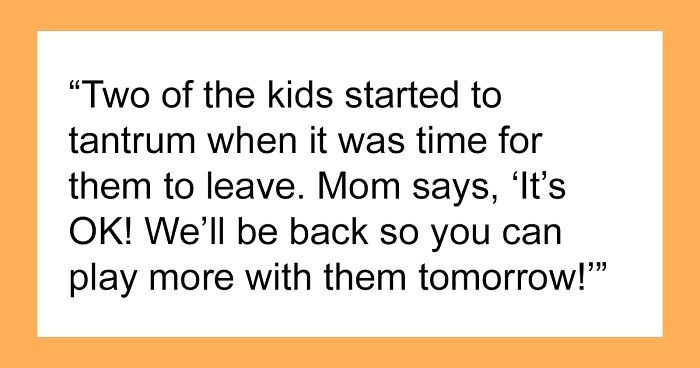
“This Was Bizarre And Horrible”: House Owner Shares How 15 Minutes With Their Housekeepers’ Kids Made Her Cancel On Them
If you’ve ever ordered something online – be it a tank top from Amazon or babysitting services from Sittercity – you know well there’s a significant possibility that it won’t be what you expect. In rare cases, it might even come with an entitled pair of parents as a bonus.
As u/abysmalrotoscoping shared with the ‘Entitled Parents‘ community, she hired a local husband-and-wife tag team to look after her house temporarily. To her surprise, the couple decided to bring their children along for the job. Initially, she didn’t think it was a major issue. However, what truly astounded her was the havoc the kids unleashed and their parents’ relaxed approach towards the resulting chaos. We get a sense there won’t be a second meeting after this.
When ordering services online, it’s important to go through everything thoroughly if you don’t want any surprises
Image credits: Tima Miroshnichenko (not the actual photo)
A woman shared how her house was turned upside down after potential cleaners paid her home a visit and brought all their kids along
Image credits: LightFieldStudios (not the actual photo)
Image credits: abysmalrotoscoping
Unruly children or not, people are very supportive of small businesses in America
Image credits: Andrea Piacquadio (not the actual photo)
It goes without saying that small businesses are the beating heart of our economy. According to the University Of Minnesota, they generate about half of America’s GDP and even saw a boom after the pandemic. And while there’s no shortage of those shutting down their operations each year – a natural part of the economy, Gene Marks, the author of ‘The Small Business Desk Reference,’ argues – it mostly comes down to luck and how people conduct their businesses.
Seeing how the pair presented themselves to the story’s author, then, it’s not really a surprise that 87% of consumers read online reviews for local businesses, according to Bright Local. Sure, supporting local businesses enhances community well-being and keeps the dollar where it should belong (in the community) – something that was particularly prevalent during the pandemic years, when one-third of small businesses in the US had no other choice but to close down. But if you bring your unruly kids to a business transaction, what else can you expect?
Perhaps these parents are afraid that they’re not spending enough time with their little ones and so they try to juggle both at the same time? Well, the good news is that a recent study has found that it doesn’t matter how much time parents spend with their kids and has “virtually no relationship to how children turn out.”
Of course, there’s a fine line between conducting your business and choosing to let your kids be part of it
Image credits: Tima Miroshnichenko (not the actual photo)
The same report, then, also sheds some light on the negative effects of spending time with stressed parents on children. Guilty, anxiety-ridden parents grappling with the delicate balance of work and childcare have been found to be associated with undesirable outcomes, including diminished math scores and behavioral issues. However, intriguingly, the study’s authors suggest that the quantity of time spent with parents holds little significance, except during the tumultuous teenage years, when an engaged mother or father can potentially reduce the temptation for unlawful behavior.
Then, is a child’s behavior always a reflection of its folks? We can understand why a parent who “doesn’t bat an eyelash” upon witnessing their children’s carnage can create a worrying impression of them in front of other adults, more so when they are your potential customers. As Peggy Drexler, the author of ‘Our Fathers, Ourselves: Daughters, Fathers, and the Changing American Family,’ argues in her article: “When they’re acting out in the supermarket or throwing a fit on the playground or being cruel to other kids, we worry what everyone around us is thinking, fearing the worst: What sort of mother is she? Can’t she control him? Even if, of course, we didn’t teach him to behave in such a way.”
But here’s the thing: many parents can’t help but feel like their parenting methods are constantly under scrutiny. Surprisingly, a whopping 9 out of 10 non-parents in America openly admit to passing judgment on others based on how their children behave. While it may be somewhat understandable, considering those without kids might struggle to grasp the challenges of keeping little ones in line, it actually speaks more to parents’ ability to stay organized rather than their parenting choices. After all, it says more about parents’ organization skills rather than their parenting decisions, if they choose to conduct a business meeting with their kids roaming free and uncontrolled in a stranger’s home.
Without realizing it, there are ways that many parents enable their children’s misbehavior
Then again, it’s hard to resist the notion that parents are the ones who enable their kids’ misbehavior. Although, it’s become somewhat popular to point the finger at Oppositional Defiant Disorder (‘ODD’ in short), a “condition characterized by a consistent pattern of behavior in which a child exhibits uncooperativeness and anger towards individuals in positions of authority,” Daniel Flint, a pediatric psychology fellow at Children’s Hospital Orange County, explained to Bored Panda in an email. However, it’s been found that only 2% to 11% of all children, usually boys, seem to have this rare condition.
Speaking of children’s disobedience, Flint says there are a couple of ways parents can enable it. “Utilizing time-outs as a disciplinary measure for misbehaving children,” he argued, “can be a hit-or-miss approach. While brief time-outs have been proven effective for younger kids, sending them to their room often yields unintended consequences.” Not only do children have access to entertainment in their rooms, rewarding their misbehavior, but the act of separating from the parent can give them a sense of control over the situation.
Instead, Flint suggests, it’s better to implement time-outs in common areas like the living room or kitchen, clearly explaining the reason and consequences. According to Cheryl McNeil, West Virginia University child psychology professor, a time-out should last no longer than five minutes – there’s no evidence that a longer stint has more of an effect. For older children, then, temporarily withdrawing privileges such as phone usage, the lifeline to their social life, can be more impactful.
“From infancy, babies learn that attention, love, and safety are intertwined,” Flint explained. “Parents respond to their cries and share in their laughter, reinforcing the idea that attention is a rewarding experience. As children grow, parental attention becomes their most coveted reward.”
While it may take time to get used to, focusing on kids’ positive behavior bears more fruit than solely focusing on their misbehavior
When a child misbehaves at home, however, parents naturally tend to focus more on the misbehavior rather than praising desirable behavior. “This tendency stems from our adult lives, where meeting expectations is often expected without receiving constant praise,” he said. While it’s important to address inappropriate behavior, it is “equally crucial to balance the attention given by also praising and acknowledging the child’s positive actions.” According to the Child Mind Institute, offering praise and recognition for desired behavior is far more effective compared to focusing only on behavior that makes you look like a sloppy parent in front of others.
When it comes to giving instructions to children, ‘beta commands’, for example, “Johnny, go get your homework from the living room, put it in your backpack, then get your shoes on and get ready to head to school!”, often fall short in two ways, Flint said. First, “kids may genuinely forget the multiple steps in the command and face criticism for their forgetfulness. Secondly, the vague instruction to ‘get ready for school’ can lead to confusion and subsequent chastisement for not meeting expectations.” This can create a sense of hopelessness and diminish their motivation to comply.
On the other hand, ‘alpha commands’, particularly beneficial for children with ADHD, provide clearer instructions with a focus on one task at a time. “It is crucial to reward successful completion of these tasks with praise, regardless of how ordinary they may seem,” he noted. By consistently setting clear expectations and offering positive reinforcement, children develop a connection between task completion, recognition, and motivation for future compliance.
The homeowner filled people in with more info about the chaotic visit
People were no less disturbed about the situation and offered the author some useful suggestions
OP really has a heavenly patience. I generally don't like children so they wouldn't have even gotten over the doorstep of my home, but if one of these brats tried to tear my childhood memorabilia to pieces it would fly straight into the mother's face.
OP invites contractor to their house to estimate repairs, contractor brings children who trash OP's home, OP and husband still choose to hire and pay contractor. OP lost all my sympathy at that point.
OP really has a heavenly patience. I generally don't like children so they wouldn't have even gotten over the doorstep of my home, but if one of these brats tried to tear my childhood memorabilia to pieces it would fly straight into the mother's face.
OP invites contractor to their house to estimate repairs, contractor brings children who trash OP's home, OP and husband still choose to hire and pay contractor. OP lost all my sympathy at that point.

 Dark Mode
Dark Mode 

 No fees, cancel anytime
No fees, cancel anytime 










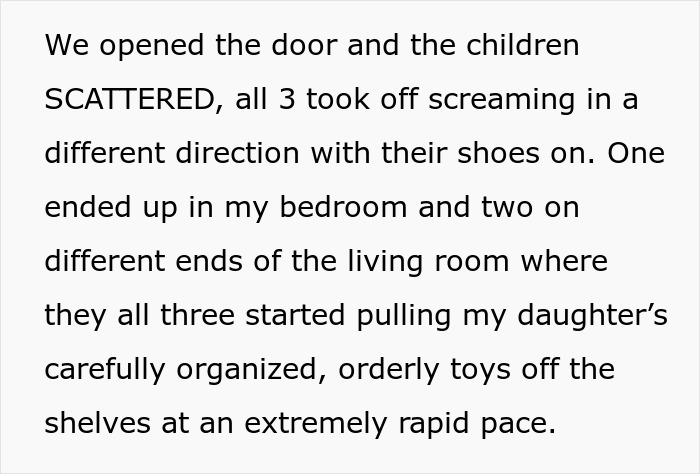

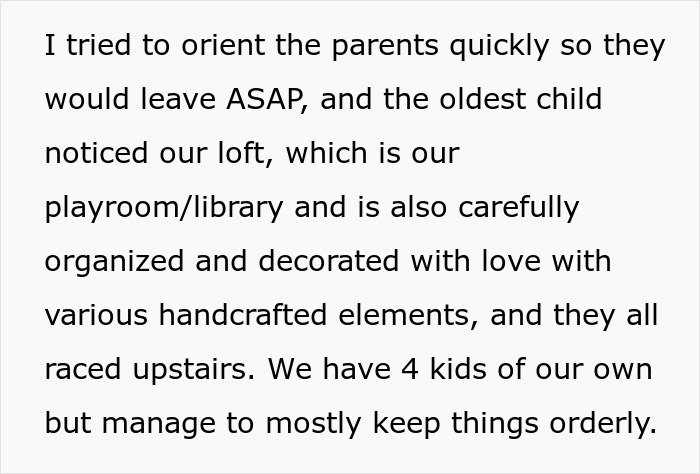

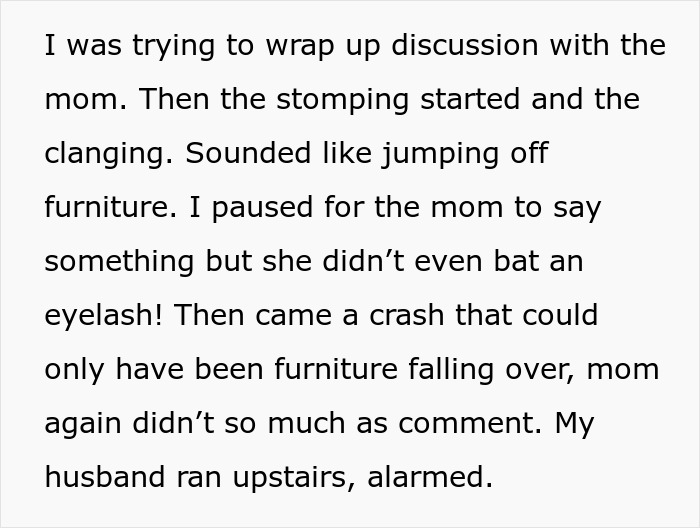
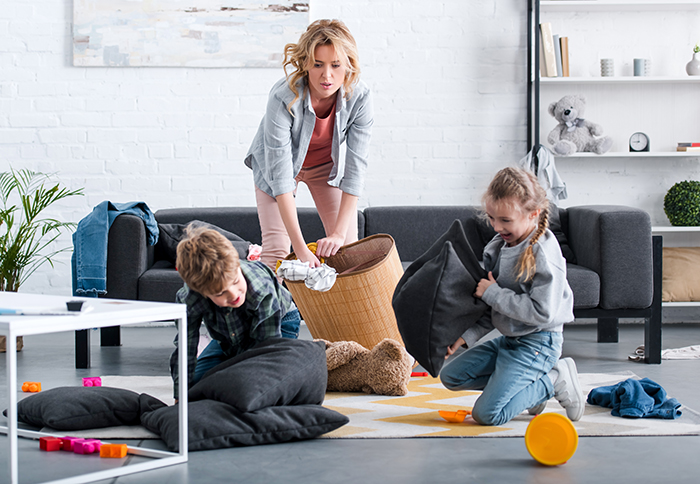
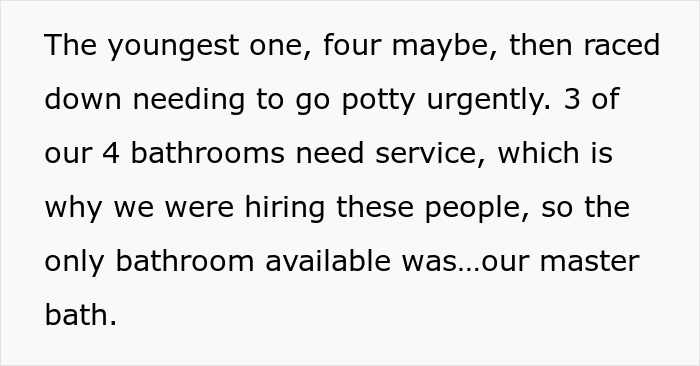
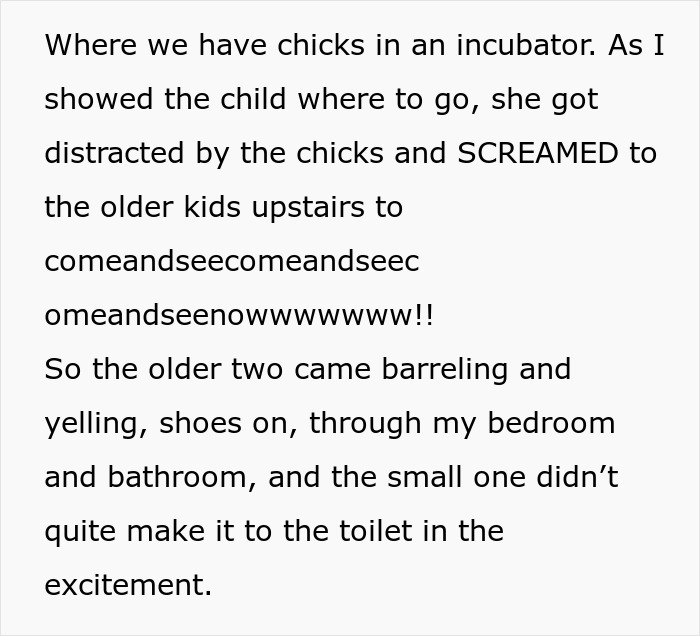
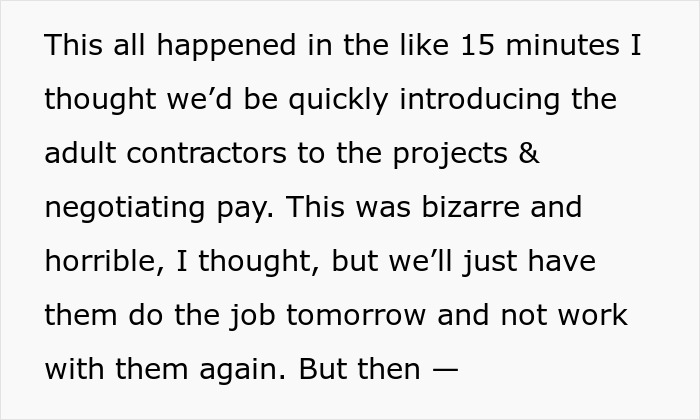
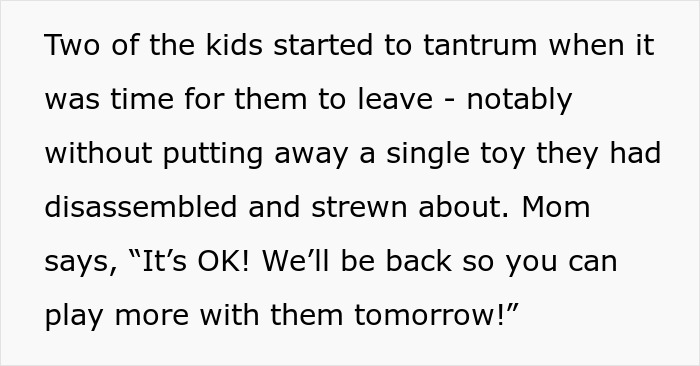
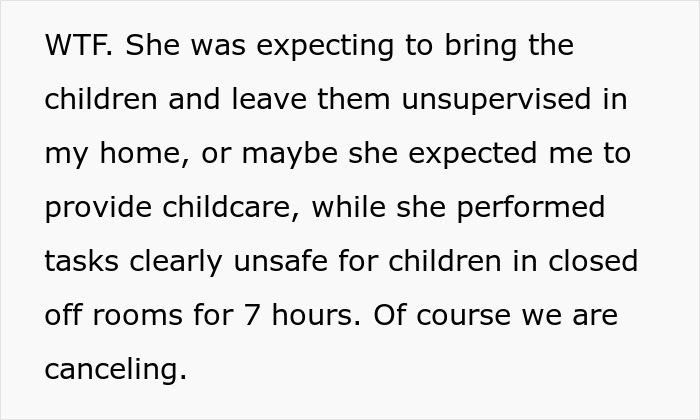





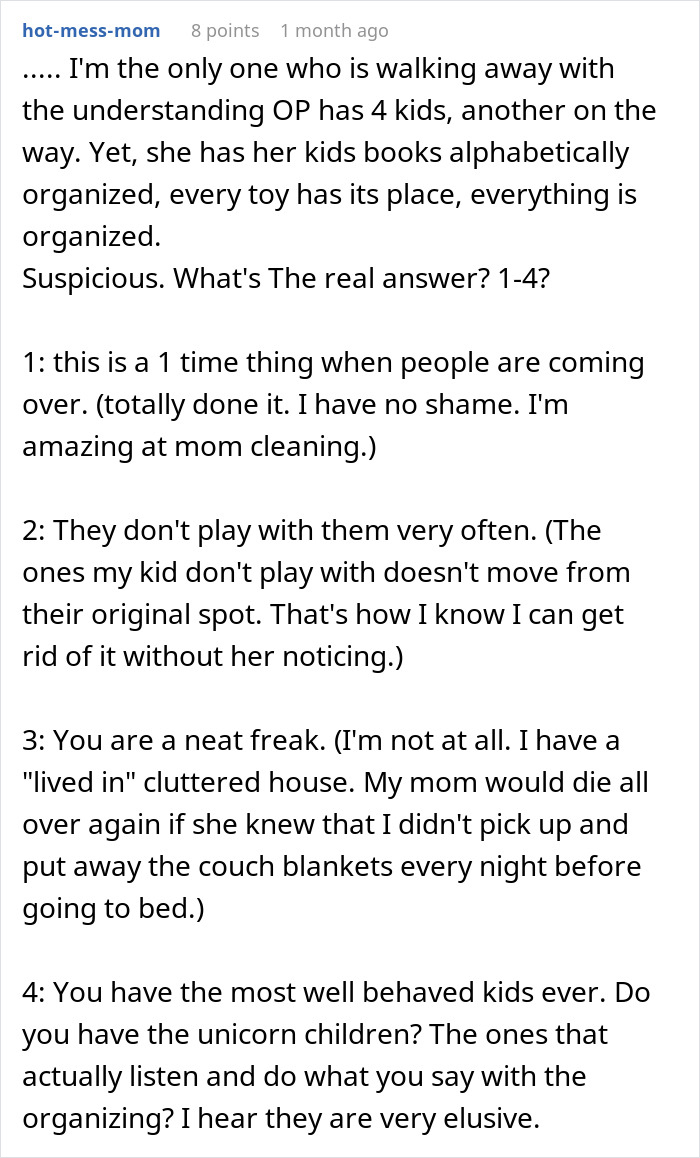
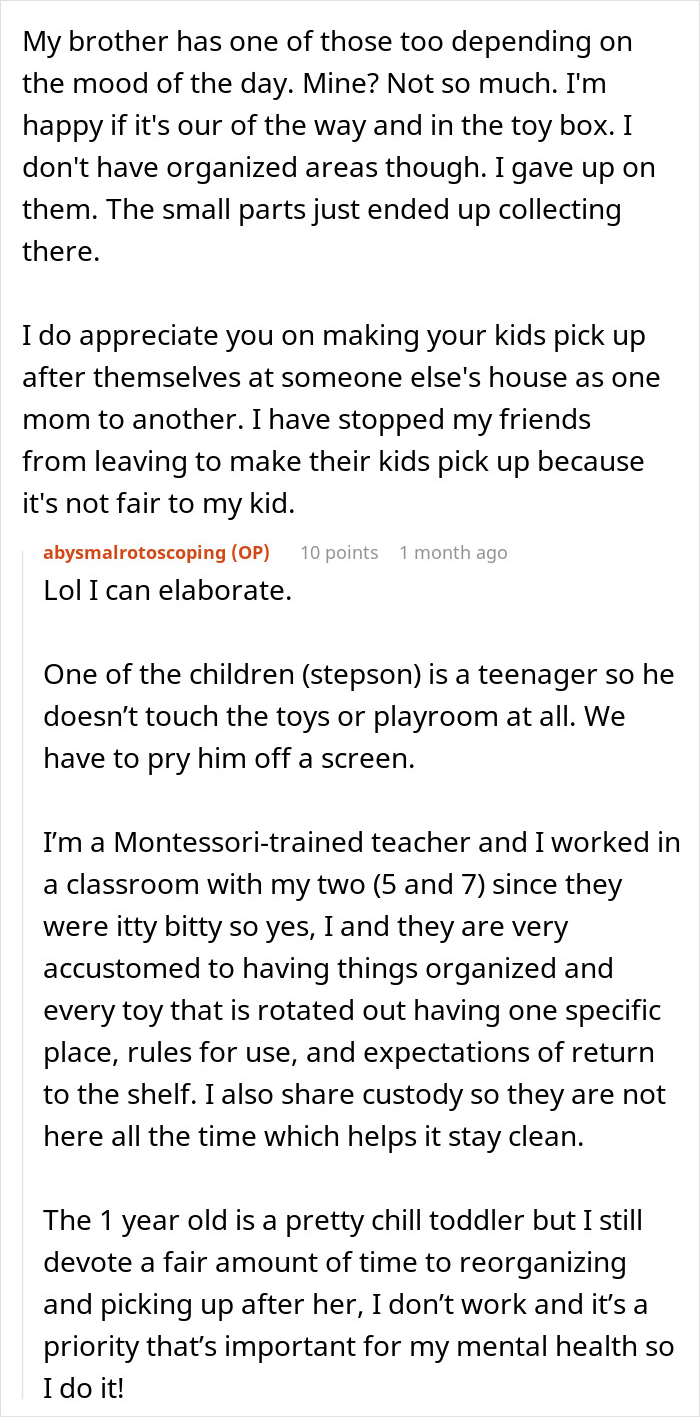

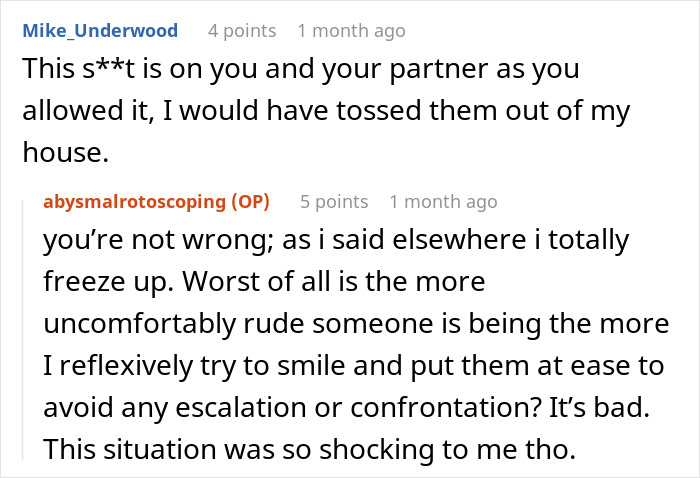







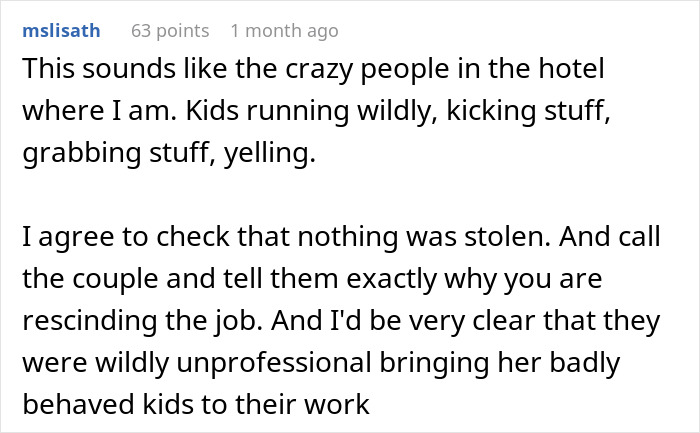












































76
16